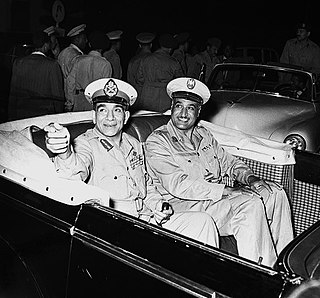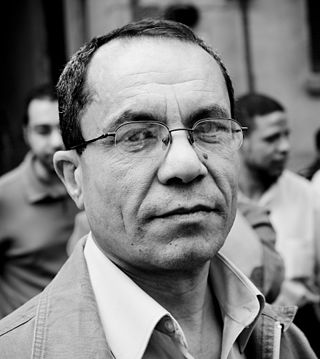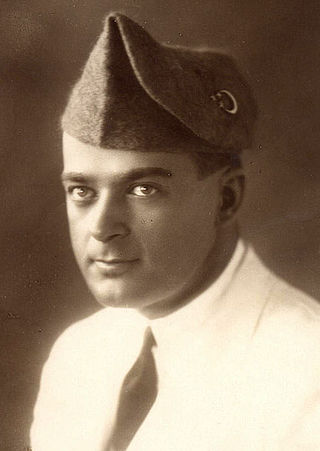Related Research Articles

Egyptian Jews constitute both one of the oldest and one of the youngest Jewish communities in the world. The historic core of the Jewish community in Egypt mainly consisted of Egyptian Arabic speaking Rabbanites and Karaites. Though Egypt had its own community of Egyptian Jews, after the Jewish expulsion from Spain more Sephardi and Karaite Jews began to migrate to Egypt, and then their numbers increased significantly with the growth of trading prospects after the opening of the Suez Canal in 1869. As a result, Jews from many territories of the Ottoman Empire as well as Italy and Greece started to settle in the main cities of Egypt, where they thrived. The Ashkenazi community, mainly confined to Cairo's Darb al-Barabira quarter, began to arrive in the aftermath of the waves of pogroms that hit Europe in the latter part of the 19th century.

The Egyptian Revolution of 1952, also known as the 1952 coup d'état and 23 July Revolution, was a period of profound political, economic, and societal change in Egypt. On 23 July 1952 the revolution began with the toppling of King Farouk in a coup d'état by the Free Officers Movement. This group of army officers was led by Mohamed Naguib and Gamal Abdel Nasser. The Revolution ushered in a wave of revolutionary politics in the Arab World, and contributed to the escalation of decolonisation, and the development of Third World solidarity during the Cold War.
The Palestine Arab Workers' Society established in 1925, was the main Arab labor organization in the British Mandate of Palestine, with its headquarters in Haifa.

The Tunisian General Labour Union is a national trade union center in Tunisia. It has a membership of more than one million and was founded January 20, 1946.

Joel Beinin is Donald J. McLachlan Professor of History and professor of Middle East history at Stanford University. From 2006 to 2008 he served as director of Middle East studies and professor of history at the American University in Cairo.
Trade unions in Egypt first emerged at the start of the 20th century, although organised collective action in the form of strikes undertaken by workers was recorded as early as 1882. Following Egypt's formal independence in the mid-1950s trade unions were incorporated into state structures and only one officially recognised national centre existed. Starting in the 1970s and intensifying dramatically during the first decade of the 21st century, an independent, organised labour movement took root in the country. This movement ultimately played a significant role in the Egyptian revolution of 2011 and the subsequent growth of independent trade unions and trade union pluralism. However, with the 2013 Egyptian coup d'état and changes in laws governing trade unions, the situation for labour rights significantly worsened. In March 2018, independent unions were dissolved and required to reregister within 60 days; of 1,000 independent unions in existence previously, only 122 were recognised by the state within the time frame.
Workers Committee for National Liberation – Political Organisation for the Working Class was a militant anti-imperialist labour organisation in Egypt. The emergence of WCNL was part on an ongoing radicalization and upsurge of the national movement in Egypt 1945–1946.
The Egyptian Communist Organisation was a political organisation in Egypt. The group emerged in mid-1948 as the Voice of the Opposition, following a split from the Democratic Movement for National Liberation. Voice of the Opposition published Sawt al-brulitaria. In December 1948 the group merged with the group Toward Bolshevik Organisation, becoming the Egyptian Communist Organisation. It was dubbed as 'MISHMISH', a pejorative distortition of its acronym. Mishmish (مشمش) means apricot in Arabic.
The Democratic Movement for National Liberation was a communist organization in Egypt from 1947 to 1955. HADITU was led by Henri Curiel. The movement followed the line of the National Democratic Revolution.
Al-Jamahir was an Arabic language weekly newspaper and the official organ of the Democratic Movement for National Liberation a communist organization in Egypt between 1947 and 1955.
The Unified National Leadership of the Uprising is a coalition of the local Palestinian leadership. During the First Intifada it played an important role in mobilizing grassroots support for the uprising. In 1987, the Intifada caught the Palestine Liberation Organisation (PLO) by surprise, the leadership abroad could only indirectly influence the events. A new local leadership emerged, the Unified National Leadership of the Uprising (UNLU), comprising many leading Palestinian factions. The disturbances, initially spontaneous, soon came under local leadership from groups and organizations loyal to the PLO that operated within the West Bank and Gaza Strip; Fatah, the Popular Front, the Democratic Front and the Palestine Communist Party. The UNLU was the focus of the social cohesion that sustained the persistent disturbances. After King Hussein of Jordan proclaimed the administrative and legal separation of the West Bank from Jordan in 1988, the UNLU organised to fill the political vacuum.
Youssef Darwish was an Egyptian labour lawyer, communist and activist. During his years of political activism, he was frequently accused of communist subversion and imprisoned, spending around 10 years of his life in jail. Of Jewish background, he converted to Islam in 1947. He was one of the few from the Karaite Jewish community to remain in Egypt after the establishment of Israel in 1948.

Kamal Abbas is General Coordinator of the Center for Trade Unions and Workers Services (CTUWS), an activist group for independent unions in Egypt. Involved in activism for over 20 years, Abbas has been active in mobilizing worker support during the Egyptian Revolution of 2011 and its aftermath. His approach emphasizes peaceful strikes and rallies accompanied by demands for better wages and working conditions, as well as more regular elections for union officials, and an independent union system.
The Misr Spinning and Weaving Company is a large textile company located in El-Mahalla El-Kubra within the Nile Delta of Egypt, approximately 80 kilometers north of Cairo. It is a state-owned enterprise held by the Holding Company for Cotton, Spinning, Weaving and Garments. Egypt's largest industrial facility employs over 25,000 workers, many of whom have played an active role in Egyptian labor struggles. Large protests and strikes at Misr Spinning and Weaving since 2006 contributed to the collapse of the Mubarak government, the 2011 Egyptian revolution, and the Arab Spring more generally.

Abbas Halim, also known as Nabil Abbas Halim or Sherief Abbas Halim, was a prince of the Muhammad Ali Dynasty and a labour activist in Egypt.
The Manual Trade Workers Union was a union created in 1909 to further the interests of Egyptian trade laborers and craftsmen and protect them from the growing influence of foreign imperialists on the employment sphere in Egypt.

Al-Ittihad is an Arabic language daily newspaper in Israel. Based in Haifa, it was established in 1944 and is owned by the Israeli Communist Party. It is the oldest Arabic media outlet in Israel and considered the most important. The newspaper is currently edited by Aida Touma-Suleiman.
Al-Malayin was a weekly newspaper published from Cairo, Egypt.

Kamal Abu Eita is a long-time Egyptian trade unionist and former government minister. As a civil servant at the Real Estate Tax Authority, Abu Eita led a successful struggle for trade union autonomy against the state-controlled Egyptian Trade Union Federation (ETUF) during the Mubarak regime. A prominent figure during the 2011 Egyptian Revolution he helped found the country's first independent union confederation, the Egyptian Federation of Independent Trade Unions (EFITU). Elected to the People's Assembly following the democratic parliamentary election of 2011-12, Abu-Eita served as Minister of Manpower and Immigration between July 2013 and March 2014.
The Cicurels were a prominent Sephardic Jewish family in Egypt throughout the first half of the 20th century, best known for the elite department store chain bearing their family name. Moreno Cicurel, the family patriarch, emigrated from Turkey in the latter half of the 19th century. Other members of the family remained in Smyrne until the beginning of 20th century and then migrated to the USA and to France. Moreno Cicurel established Les Grands Magasins Cicurel at the turn of the century. His three sons helped grow the business to prosperity and acclaim following his death.
References
- 1 2 3 Beinin, Joel, and Zachary Lockman. Workers on the Nile: nationalism, communism, Islam, and the Egyptian working class, 1882 - 1954 . Cairo: The American University in Cairo Press, 1998. pp. 232-233
- ↑ Beinin, Joel, and Zachary Lockman. Workers on the Nile: nationalism, communism, Islam, and the Egyptian working class, 1882 - 1954 . Cairo: The American University in Cairo Press, 1998. pp. 233-234
- ↑ Beinin, Joel, and Zachary Lockman. Workers on the Nile: nationalism, communism, Islam, and the Egyptian working class, 1882 - 1954 . Cairo: The American University in Cairo Press, 1998. pp. 235-236
- ↑ Beinin, Joel, and Zachary Lockman. Workers on the Nile: nationalism, communism, Islam, and the Egyptian working class, 1882 - 1954 . Cairo: The American University in Cairo Press, 1998. pp. 237-238